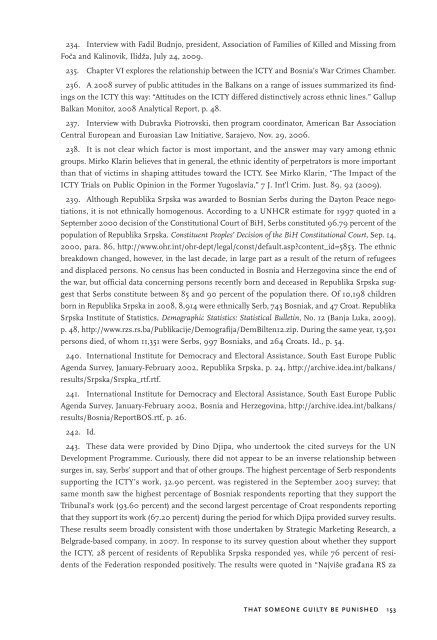That Someone Guilty Be Punished - International Center for ...
That Someone Guilty Be Punished - International Center for ...
That Someone Guilty Be Punished - International Center for ...
You also want an ePaper? Increase the reach of your titles
YUMPU automatically turns print PDFs into web optimized ePapers that Google loves.
234. Interview with Fadil Budnjo, president, Association of Families of Killed and Missing from<br />
Foča and Kalinovik, Ilidža, July 24, 2009.<br />
235. Chapter VI explores the relationship between the ICTY and Bosnia’s War Crimes Chamber.<br />
236. A 2008 survey of public attitudes in the Balkans on a range of issues summarized its findings<br />
on the ICTY this way: “Attitudes on the ICTY differed distinctively across ethnic lines.” Gallup<br />
Balkan Monitor, 2008 Analytical Report, p. 48.<br />
237. Interview with Dubravka Piotrovski, then program coordinator, American Bar Association<br />
Central European and Euroasian Law Initiative, Sarajevo, Nov. 29, 2006.<br />
238. It is not clear which factor is most important, and the answer may vary among ethnic<br />
groups. Mirko Klarin believes that in general, the ethnic identity of perpetrators is more important<br />
than that of victims in shaping attitudes toward the ICTY. See Mirko Klarin, “The Impact of the<br />
ICTY Trials on Public Opinion in the Former Yugoslavia,” 7 J. Int’l Crim. Just. 89, 92 (2009).<br />
239. Although Republika Srpska was awarded to Bosnian Serbs during the Dayton Peace negotiations,<br />
it is not ethnically homogenous. According to a UNHCR estimate <strong>for</strong> 1997 quoted in a<br />
September 2000 decision of the Constitutional Court of BiH, Serbs constituted 96.79 percent of the<br />
population of Republika Srpska. Constituent Peoples’ Decision of the BiH Constitutional Court, Sep. 14,<br />
2000, para. 86, http://www.ohr.int/ohr-dept/legal/const/default.asp?content_id=5853. The ethnic<br />
breakdown changed, however, in the last decade, in large part as a result of the return of refugees<br />
and displaced persons. No census has been conducted in Bosnia and Herzegovina since the end of<br />
the war, but official data concerning persons recently born and deceased in Republika Srpska suggest<br />
that Serbs constitute between 85 and 90 percent of the population there. Of 10,198 children<br />
born in Republika Srpska in 2008, 8,914 were ethnically Serb, 743 Bosniak, and 47 Croat. Republika<br />
Srpska Institute of Statistics, Demographic Statistics: Statistical Bulletin, No. 12 (Banja Luka, 2009),<br />
p. 48, http://www.rzs.rs.ba/Publikacije/Demografija/DemBilten12.zip. During the same year, 13,501<br />
persons died, of whom 11,351 were Serbs, 997 Bosniaks, and 264 Croats. Id., p. 54.<br />
240. <strong>International</strong> Institute <strong>for</strong> Democracy and Electoral Assistance, South East Europe Public<br />
Agenda Survey, January-February 2002, Republika Srpska, p. 24, http://archive.idea.int/balkans/<br />
results/Srpska/Srspka_rtf.rtf.<br />
241. <strong>International</strong> Institute <strong>for</strong> Democracy and Electoral Assistance, South East Europe Public<br />
Agenda Survey, January-February 2002, Bosnia and Herzegovina, http://archive.idea.int/balkans/<br />
results/Bosnia/ReportBOS.rtf, p. 26.<br />
242. Id.<br />
243. These data were provided by Dino Djipa, who undertook the cited surveys <strong>for</strong> the UN<br />
Development Programme. Curiously, there did not appear to be an inverse relationship between<br />
surges in, say, Serbs’ support and that of other groups. The highest percentage of Serb respondents<br />
supporting the ICTY’s work, 32.90 percent, was registered in the September 2003 survey; that<br />
same month saw the highest percentage of Bosniak respondents reporting that they support the<br />
Tribunal’s work (93.60 percent) and the second largest percentage of Croat respondents reporting<br />
that they support its work (67.20 percent) during the period <strong>for</strong> which Djipa provided survey results.<br />
These results seem broadly consistent with those undertaken by Strategic Marketing Research, a<br />
<strong>Be</strong>lgrade-based company, in 2007. In response to its survey question about whether they support<br />
the ICTY, 28 percent of residents of Republika Srpska responded yes, while 76 percent of residents<br />
of the Federation responded positively. The results were quoted in “Najviše grad¯ana RS za<br />
THAT SOMEONE GUILTY BE PUNISHED 153

















